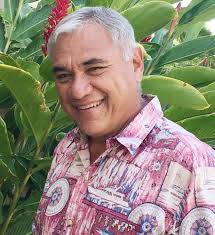The former chief of the state Department of Land and Natural Resources said Monday that there’s no political will to deal with the consequences of sea-level rise brought about by climate change.
William Aila Jr., now the deputy chairman of the Department of Hawaiian Homelands, made his remarks during a conference about climate change. The conference was at the East-West Center on the University of Hawaii at Manoa campus in Honolulu.
“There’s some great plans that are in place. We have the science. … We lack the political will right now,” Aila told conference-goers. “But along with that political will comes what are we willing to sacrifice? Because we are going to have to sacrifice something in order to get the changes that we need with sea-level rise and climate change. … We are the problem. Our behavior is the problem. Our lifestyle is the problem. The models (of behavior) that we grew up with and went to school with, learned about, is the problem. How do we have a sustainable process that leans up against an economic process that requires growth in order for it to be achieved? Those are two diametrically opposed systems.
“What hybrid system are we going to come up with, and what are we going to give up … to do this? Because that’s what’s going to be needed in the future.”
Jennifer Jurado, director of environmental planning and community resilience in Broward County, Fla., who has a doctorate degree in marine biology, said she’s using a shoreline planning model that predicts “a sea-level rise of two feet by 2060.”
Jurado said the sea-level rise also will have an effect on groundwater tables.
Jeff Dack, Planning Department supervisor for Maui County, said planners are trying to adopt projected sea-level rise figures “into our current (shoreline) setback policies.”
“We have a lot of ideas about what needs to be done,” he said “Now, I think we need to put our attention to how we’re going to do it. … We’ve all got to be part of the conversation and keep the pressure on.”
Steve Long of The Nature Conservancy in Massachusetts said the climate change brought about by greenhouse gas emissions into the atmosphere means “there are going to be a lot of 90 degree days.”
Long said that despite differences in longitude, latitude and climate, Hawaii and Massachusetts “have a number of things in common.”
“We both have large coastlines. Massachusetts has 1,500 miles of coastline. And the coastlines in Massachusetts are vital to tourism and fisheries,” Long said.
He added that Massachusetts, like Hawaii, has to deal with shoreline erosion and coastal flooding brought about by king tides — the informal name given to the highest high tides that occur at predictable points during the summer and winter months.
Dack said citizens “need to be vigilant” and pressure politicians to make sea-level rise a part of planning and building codes.
“We need to hold their feet to the fire, keep the pressure on, keep the conversation going,” he said.
Email John Burnett at jburnett@hawaiitribune-herald.com.












